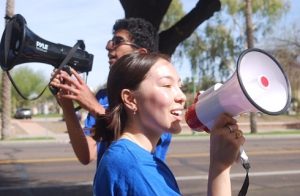
A Snapshot of Youth Climate Activism
As the impacts of climate change are seen and felt across the globe, more and more people around the world are being activated to do something about it. Many of these activists are youth organizers trying to take back the future that is being stolen from them by climate change and the powerful corporations (primarily) causing it.
March On Foundation is proud to support several fiscal projects that focus on environmental and climate justice. Most of these groups are youth-led and represent a diverse group of young climate activists in high school and college. In honor of Earth Day, we wanted to get to know some of the activists that make up these amazing organizations and hear their perspectives on climate change in 2022.
— –
Tell us a little bit about yourself- who are you beyond being a climate activist?
Catherine C., research and political team member from Houston Youth Climate Strike:
I’m into stuff like sci-fi and anime. Growing up I’ve always been into science fiction, something about it feels good. I love J-pop idols and anime about idols, I’ve also been listening to a few older K-pop groups. I enjoy making art though I don’t finish most of what I start. I also enjoy looking at alt fashion, personally I’ve been building a small decora Kei wardrobe.
Organizer, Houston Youth Climate Strike:
I am a musician and music education major at the University of Houston, and I write and bake recreationally.
Eden Naureckas, action coordinator at XR Youth NYC:
I grew up in the East Village in Manhattan which is full of a lot of very cool people. I spend my time going to my friends’ shows, drinking iced beverages and finding interesting places to visit. I’m also a current Senior at Millennium, a public school in the Financial district.
Shaela Patel, communications director of Arizona Youth Climate Coalition:
I’m a junior in high school, a member of AZYCC, and a volunteer at the Reid Park Zoo! I love to bake, read, listen to music, and paint watercolors.
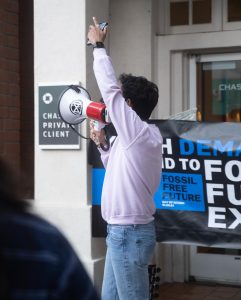
What made you join the fight against climate change?
Organizer, Houston Youth Climate Strike:
Living in Houston, I experienced the personal impacts of the climate crisis. I wanted to address the threat it poses to my community and mitigate the impacts as much as possible.
Catherine C., research and political team member from Houston Youth Climate Strike:
All my life I’ve been acutely aware of how…doomed the world is. I’ve always wanted to do something about it. Recently I learned about the solarpunk movement and that got me motivated to be more active in the cause so I joined HYCS.
Organizer, Houston Youth Climate Strike:
I couldn’t bring myself to sit by the sidelines and do nothing as we watch corporations destroy our futures for short-tern gain.
Shaela Patel, communications director of Arizona Youth Climate Coalition:
I have always loved animals, and when I learned about climate change a couple years ago, and how it was effecting not only animal but human lives, I was encouraged to take action.
What percent of our current climate crisis would you say is due to corporations rather than individuals? What is the best way we can put pressure on corporations that will actually yield results?
Catherine C., research and political team member from Houston Youth Climate Strike:
Considering the fact that corporations are the ones mass producing things, I’d say an easy 90% as a conservative guess. Honestly there’s very little that could promise effective pressure on corporations, it would take making them lose money somehow. Strict taxes and fees, mass boycotts, people relying on each other more than mass produced goods and stuff.
Organizer, Houston Youth Climate Strike:
This is a complicated question, but my guess is around 90%. Voting for legislators who will implement environmentally progressive regulations on corporations is the most accessible way to control these companies’ actions, since “voting with your dollar” isn’t always a financially feasible option for many people.
Eden Naureckas, action coordinator at XR Youth NYC:
Honestly 100%. The actual figure is 71% carbon emissions come from 100 companies, but I don’t think any individual can make a choice that has not somehow been pushed by a corporation. We shouldn’t be putting blame on people even if they fly on planes, drive a truck, have their AC blasting, whatever. Who’s making those devices and why haven’t they chosen to use a cleaner fuel source for their product? Why aren’t all packages easily recyclable and why aren’t the people who make them in charge of recycling them? This isn’t to say people shouldn’t try to make environmentally friendly choices when they can. But when it comes to who’s really to blame for the state of the planet right now, I think it’s corporations all the way.
Shaela Patel, communications director of Arizona Youth Climate Coalition:
I read an article that said around 100 corporations were responsible for 71% of the world’s carbon emissions. Corporations are directly responsible for the climate crisis, however it is the consumers that fuel these corporations. The corporations need to take action on their part, but the best way to pressure these giant corporations is to by boycotting their products. We need to switch to supporting small, BIPOC-owned, local companies because we will not only be helping the planet, but also helping the community.
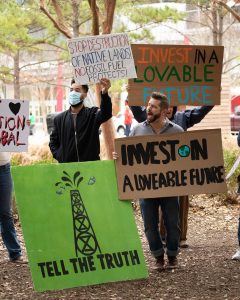
What is one unique thing that your organization is doing to fight climate change?
Organizer, Houston Youth Climate Strike:
Honestly, I’m not sure I could point out a specific answer. We are putting effort into our cause, though, and that’s enough for me to feel fulfilled here.
Organizer, Houston Youth Climate Strike:
Vote and get other people to vote. Also, try to avoid replacing anything unless you absolutely have to.
Eden Naureckas, action coordinator at XR Youth NYC:
I think our focus on mutual aid is a big one. I feel like a lot of people think “sure, mutual aid is great, but does it really help the climate crisis?” I think it does, especially when we’re doing things like handing out blankets and umbrellas before a storm, or cold bottles of water in a heat wave. People without homes are suffering most when the increasingly extreme weather events hit. Fighting climate change doesn’t just mean attacking the fossil fuel companies, it means helping those who are currently being harmed by the climate crisis right now. We need to be doing both.
Shaela Patel, communications director of Arizona Youth Climate Coalition:
We have youth power. Though most of us can’t vote, we are organizing and pressuring people in power to think about the younger generations and what future they are leaving behind for us. We are also very tight-knit because of our ages, so we work together very well.
A lot of people want to be more helpful in combatting climate change, but don’t know where to start. What are one or two easy ways that you fight climate change in your day-to-day life?
Organizer, Houston Youth Climate Strike:
I think one of the most effective ways youth can help fight climate change is to increase advocacy around their peers. From my experience, talking to your friends and family is the best way to get someone involved in a movement.
Catherine C., research and political team member from Houston Youth Climate Strike:
I ride the Metro to and from school everyday, I’ve gotten started on a garden in my backyard so I’ve been tending to the plants.
Shaela Patel, communications director of Arizona Youth Climate Coalition:
Listen and vote. Most people would [point] to individual actions that we grew up learning like turning the lights off when we are not using them or carpooling to places. These actions are important but they are not enough. One thing you can do in your day-to-day life is to listen to climate activists, whether that be on social media or the news. When you listen to their stories and experiences, you are amplifying their message and educating yourself. Listen to not only the famous activists, but also your local climate activists as well as low-income, BIPOC activists because their stories can help influence your daily actions. Additionally, voting is super important especially now. If you aren’t voting, and you are eligible, you are part of the problem. After learning, use your voice, it matters.
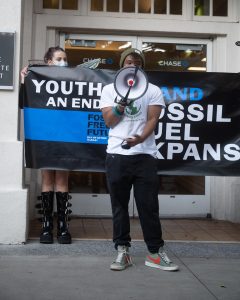
Which countries/regions in the world do you think are doing the most to help combat climate change?
Organizer, Houston Youth Climate Strike:
I think the EU has done the best job, out of most developed countries, to make significant changes to address climate change. They have made the most strides to transition their energy sector and reduce emissions.
Organizer, Houston Youth Climate Strike:
Probably Europe, from what I know. I could be more educated on the global climate scene, but those nations’ lofty goals, combined with provable progress towards them, is the most notable contribution I’ve heard of.
Shaela Patel, communications director of Arizona Youth Climate Coalition:
I think the Nordic countries in Europe are doing the best at combating climate change. I also believe that the countries who are not considered “world powers” are doing the best at combating climate change because they see taking care of the planet as helping themselves and a part of their lifestyle.
What do you do for self-care when you feel yourself getting burned out?
Organizer, Houston Youth Climate Strike:
I think it’s very important to take breaks whenever possible to avoid long term burnout.
Catherine C., research and political team member from Houston Youth Climate Strike:
I disconnect from the news and social media. I feel guilty for not keeping up, but I have to remind myself that if I remain burned out I won’t be able to do anything at all later on.
Organizer, Houston Youth Climate Strike:
Nothing. I’m terrible at self-care. Maybe eat ice cream, but that doesn’t seem like a particularly constructive coping mechanism.
Shaela Patel, communications director of Arizona Youth Climate Coalition:
I am definitely still learning with this, but I tend to take a break to do something I love, whether that be listening to music and painting or snuggling up in a blanket and watching TV. Additionally, in Arizona Youth Climate Coalition, we often have bonding nights where we do something fun over Zoom and get to know each other outside of our “climate action” selves. Those help me de-stress when I feel burnt out because I am constantly laughing when I’m around my friends.
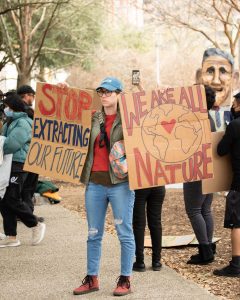
What is one common misconception about climate change or climate justice that you wish was corrected more?
Organizer, Houston Youth Climate Strike:
It is NOT a political issue. Hurricanes and heat waves don’t care who’s on your bumper sticker.
Eden Naureckas, action coordinator at XR Youth NYC:
I think the lack of recognition of BIPOC climate activists is a huge issue. I think a lot of attention has been given to Greta [Thunberg], and more recently Peter Kalmus, and they deserve it, but is a shame that there are so many people of color who have also been doing the work, especially on a community level, that go completely unrecognized. I blame the major media organizations for this, and their selectivity with who gets to be in the spotlight. I encourage people to look around and see if there are local organizers, especially Indigenous and Black youth, who are doing things to fight the climate crisis and support them any way they can.
Shaela Patel, communications director of Arizona Youth Climate Coalition:
That it can be solved if everyone just bikes places or takes individual actions. I understand this is how to teach younger kids about climate change, but when you reach high school and college, no one learns anything different about climate action. We need to be taught that individual actions won’t save the world because the government is in control of our attachment to fossil fuels, the monoculture agriculture systems, and most of the corporations who are responsible for most carbon emissions. The climate crisis is happening now, and people need to take that seriously.
Who is one person, dead or alive, that you think deserves more recognition for their work in climate science/activism?
Shaela Patel, communications director of Arizona Youth Climate Coalition:
There are so many. AZYCC does a social media series where we highlight youth who are taking action across the world who are not getting the recognition they deserve, and I have learned so much from contributing to that series. One group that I am currently obsessed with, though it was a while back, is the students who sued the Supreme Court for their future in Julianna v. US. Just the action of suing those in power is the most incredible thing. They are so brave and they give me immense hope for the future. Their side may not have won, but that is by far the most powerful action I have ever seen youth take, and they deserve more support and recognition for what they did. They told youth that their voice matters. Since their trial, youth activism has taken off even more.

Do you think that the wealthiest of us could be doing more to combat climate change? Ideally, what would be their contribution?
Catherine C., research and political team member from Houston Youth Climate Strike:
Give up your fossil fuel industries, rich boys.
Organizer from Houston Youth Climate Strike:
Invest in green energy and pay more for those sustainable options (bar shampoo/conditioner, ethical and sustainable clothing that lasts longer, vegan foods) that not everyone can afford.
Eden Naureckas, action coordinator at XR Youth NYC:
First of all, support mutual aid. Regularly, not just once. It’s easy to find people close to you who are in need of help, especially following any sort of disaster where people are getting displaced. Also, of course, give your money to groups working to fight the climate crisis, and tell people you’re doing it and why. Use your connections to multiply your impact and get informed so you can educate others in turn.
Shaela Patel, communications director of Arizona Youth Climate Coalition:
Yes, the wealthy have so much power, and they definitely could be doing more. Especially influencers. I have only seen a few influencers take a stance and action on climate action. There is one singer, Joshua Bassett, who has used his platform for good, and I think influencers can take after him. 100% of his merchandise proceeds go to a charity of your choice that he supports, and one of the charities you can choose from on his website is the Sunrise Movement. He also has done a few lives with youth activists to help inspire others. The wealthy have the means to contribute by donating to efforts to stop climate injustice and climate action organizations. They can also donate to candidates who are planning to take action and help support their campaigns.
What is one thing that always gives you hope for the Earth’s future?
Organizer, Houston Youth Climate Strike:
I hope that we are able to change the way people and policymakers think and pass sensible policies to make the necessary changes for the environment.
Catherine C., research and political team member from Houston Youth Climate Strike:
The solarpunk movement! They’re built on an optimistic viewpoint. They don’t ignore the issues or anything, but they encourage action and fight doomer-ist attitudes that would lead to no change at all.
Organizer, Houston Youth Climate Strike:
I’m Christian, so I believe that everything will work out the way it’s supposed to. I think we can all agree, though, that the beauty of both the natural world and the spirit of humanity is a source of hope for us all.
Shaela Patel, communications director of Arizona Youth Climate Coalition:
The power of the youth movement. Just joining one of AZYCC’s calls, I see there are other people like me who see the problems in the world and want to fix them. There are constantly news stories of all the things youth are doing to fight for the future, and that gives me hope for Earth’s future.
— –
See a full list of our fiscal projects that address climate change below:
